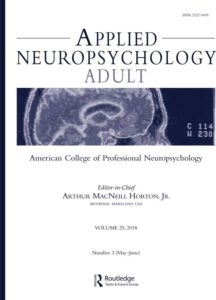The King–Devick test (K–D) has demonstrated sensitivity as a screener measure of ocular motor and cognitive problems. Despite its empirical support in the assessment of patients with certain injuries and disorders (e.g., concussion, reading disorders), less is known about the construct validity of the K–D. This study examined this topic in an outpatient, diagnostically heterogeneous clinical sample. A total of 70 individuals seen for an outpatient psychoeducational evaluation completed the K–D in addition to measures of intellectual abilities, speeded reading ability, simple and sustained attention, and executive functioning. Pearson correlation coefficients revealed that poorer K–D performance was associated with poorer processing speed, speeded reading ability and response time to target stimuli (r = .26–.31, p < .05). K–D performance was unrelated to other intellectual abilities, other aspects of attention, or executive functioning (all p > .05). Results suggest that the K–D demonstrates good convergent and discriminant validity in a heterogeneous outpatient clinical sample including individuals with attention-deficit hyperactivity disorder, specific learning disorders, and a number of different depressive and anxiety disorders. Findings support its wider use as a measure of reading ability and processing speed in clinical contexts.
Summary Points:
- Poorer performance on the King-Devick test was associated with poorer processing speed, speeded reading ability and response time to target stimuli.
- The K-D test demonstrated good convergence and discriminant validity in this outpatient, diagnostically heterogeneous clinical sample.

